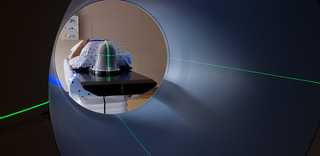Understanding radiation

As a cancer patient you may be recommended radiation therapy as part of your treatment plan. It may be prescribed before, during or after your surgery depending on a number of factors such as your type of cancer and its location, size and stage.
Although you'll naturally be anxious about this part of your treatment - as with all the other modalities - remember that you'll be in extremely good hands as this will be overseen by another vital member of your multidisciplinary team: your Radiation Oncologist who is a specialist in this field.
What is radiation therapy?
Radiation therapy (also called radiotherapy) uses high-energy x-rays to kill cancer cells, explains Dr Yastira Ramdas, a Clinical and Radiation Oncologist. "Unlike chemotherapy which spreads throughout your body, radiation therapy is far more targeted and affects cells only in the part of the body that is treated. Although some healthy tissue maybe affected in the treatment area, this generally does have the ability to repair itself, unlike cancer cells".
What to expect:
Before your radiation treatment begins, you'll consult with your Radiation Oncologist, who will plan and oversee your treatment. "At this consultation, you'll discuss the proposed radiation treatment plan and the benefits and risks will be clearly outlined to you and your family so that you'll be adequately equipped to make an informed decision about the treatment," explains Dr Ramdas. "Your next appointment is the planning or simulation session at the radiation therapy department where you'll be receiving your treatment. Here you'll get to meet the other members of the team who will be involved in your care. This includes the radiotherapist, medical physicist and support staff."
There are different types of radiation therapy that may be considered depending on your type of cancer. These include:
- External beam radiation therapy (EBRT): The most common form of radiation therapy for a wide range of cancers, which is delivered from an external source, with a highly focused beam that targets the cancerous area. Radiotherapy is typically administered every day (except weekends) for three to six weeks, generally starting about six weeks after surgery, once all your wounds have healed. Each treatment takes only a few minutes, although sometimes you may have to wait for a radiotherapy machine to become available
- Internal radiation therapy: Which is also referred to as brachytherapy where radioactive material is implanted permanently or temporarily into the tumour or surrounding tissue (e.g. for prostate cancer)
- Intraoperative Radiation (IORT): This is a single treatment in theatre, used, for example, during lumpectomy surgery in early stage breast cancer, after the cancer has been removed.
Remember that the X-rays or particles are painless and invisible and you are not radioactive after EBRT or IORT treatment, so it's safe to be around other people, including children. However permanent implants from brachytherapy - used to treat prostate cancer - do remain radioactive so your doctor will advise you about taking precautions when it comes to interacting with pregnant women and children.
What are the side effects?
Side effects tend to be more pronounced towards the end of your treatment, around week 4 of radiation, explains Dr Ramdas. Possible short term side effects include:
Skin irritation
Your radiation oncologist will advise on the appropriate treatment for any form of skin irritation. These may range from mild ‘sunburn' to peeling or occasional blistering. These can all be managed and generally subside within a week or so. Proper skin care is essential. This includes:
- Using no hot water, soaps, lotions, or perfume on your skin during and throughout treatment
- Wearing loose, light clothing (such as cotton) over the area being treated
- Avoiding heat from hairdryers, hot water bottles and the sun in the treatment area.
Fatigue
Mild to moderate fatigue is normal. This can persist for several weeks post radiation. It's important to plan your day so that you can have a rest period. Gentle exercise such as walking can be beneficial.
You may also experience a number of other side effects depending on where you have your radiation such as difficulty swallowing, mouth sores, breast tenderness and swelling, nausea, vomiting and diarrhoea. Always report these problems to your medical team as they will be able to advise you on how to best manage them. Once your radiation therapy is completed, your Radiation Oncologist will schedule follow up visits to monitor your progress and check if there are any signs of cancer recurrence. He or she will also keep a lookout for any potential late side effects such as:
- Lymphedema (swelling of the arm), which is made worse if extensive lymph node dissection is done during breast cancer surgery
- Erectile dysfunction
- Early menopause and fertility problems
Related articles
Hormones are known as the body’s chemical messengers and are produced in the endocrine glands. Hormone therapy, or endocrine therapy, is a cancer treatment that slows or stops the growth of cancer that uses hormones to grow.
If you’re about to undergo chemotherapy (chemo), one of the best things you can do is to manage your fears and give yourself some sense of control by understanding what having chemo involves so you know what lies ahead on your cancer journey.
Norma Moller’s cancer experience helps her to help others
Counselling Psychologist and breast cancer survivor, Norma Moller shares her insight into the emotional support that can energize a cancer journey and the way in which her illness brought many gifts to her life.